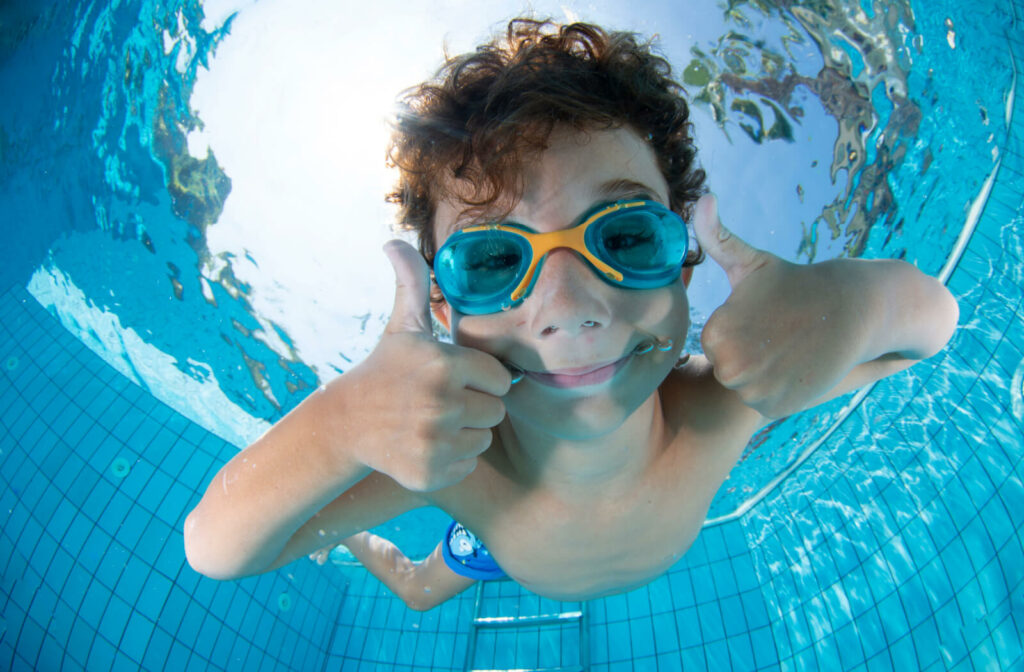As Spring gives way to Summer, we trade work and school shoes for flipflops and sneakers, enjoying summer travel and spending more time working outside. While summer can be a time of recreation and enjoyment, an increase in activity and exposure to the elements can also bring increased risk to your eyes, including sunburned corneas, eye injuries from yard work and sports, dry eye flare ups and eye emergencies at the most inconvenient times.
Summer can be some of the most challenging months for maintaining good eye health, so Medical Optometry America’s team offers you these 5 easy tips to help keep your eyes safe and healthy, allowing you to stay focused on making the most of the summer months!
1) Shield the Sun – Most people are aware of the risks of sun exposure to your skin, but your eyes are very vulnerable as well. Invest in a pair of high-quality sunglasses that provide 100% UV protection. Not only will sunglasses improve your vision on bright sunny days, but they also block harmful UV rays that can lead to an increased risk for several eye diseases, including cataracts, glaucoma, and age-related macular degeneration. Additionally, extended exposure to UV rays can result in sunburn on the surface of your eye, a condition known as photokeratitis. And if you have blue or light-colored hazel eyes or are taking certain antibiotic medications, you’re at even greater risk for UV damage to your eyes. And as a bonus, those sunglasses will protect the skin around the eyes – up to 10% of skin cancers occur on the eyelids.
2) Keep Your Eyes and Body Hydrated – Hot, dry weather, sun exposure, and summer winds can quickly cause the natural tear film on the surface of your eye to evaporate, leading to dry eye flare-ups and redness, burning, itchy sensations. Wearing sunglasses will shield your eyes from the sun and wind, but if you suffer from Dry Eye, limit your time outdoors on hot, sunny days and seek shade whenever possible.
You can also keep a supply of preservative-free artificial tears on hand and use them moderately to quench your eyes if needed. They can also be used to rinse sunscreen, dust or other irritants out of your eyes. It pays to keep one bottle in your pocket or bag, in your car, or around the house. Also, make sure you are drinking plenty of liquids throughout the day, especially during times of increased activity. The level of whole-body hydration you maintain has a direct impact on your ability to produce healthy natural tears and avoid irritating dry eye symptoms.
3) Avoid Environmental Dry Eye Threats – Warmer months increase risk for dry eye flare ups. Some simple steps can help you reduce your risk for unnecessary irritation. Avoid sleeping or spending extended periods of times in front of fans or air conditioning vents. This forced air on the surface of your eye can dry them out quickly. Also, stay on top of your seasonal allergies and be diligent about seeking care and taking any prescribed medications regularly. If you do suffer mild eye irritation, regular use of cold compresses or artificial tears mentioned above can provide temporary relief.
If you feel like you are dealing with consistent symptoms of dry eye, like redness, a gritty sensation, excessing tearing, or stringy discharge, take the proactive step of scheduling a full Dry Eye Evaluation at one of MOA’s Eye Health Centers. We have specialized dry eye experts and leading-edge testing and treatment technology that offer a personalized path to relief that lasts from this common, but troublesome condition.
4) Wear Eye Protection – Summer activities pose specific risks to your eyes. Swimming in pools filled with chemicals or lakes or oceans with salt and bacteria are just some of the ways you put your eyes at risk when the weather turns warm. Invest in a quality pair of swimming goggles that keep your eyes protected from irritation and injury when swimming underwater, even for brief periods of time. Never open your eyes underwater without goggles and don’t ever swim while wearing contact lenses.
Yard work is another high-risk activity that increases during the summer months and requires protective eyewear. Hard plastic safety goggles or glasses made of impact-resistant material like polycarbonate dramatically decrease your risk of injury or irritation from a foreign body entering the eye, which can cause irreversible damage and threaten your vision.
Make sure to wear eye protection at all times, including when:
– Gassing up a mower or cleaning up grass clippings
– Using bungee cords (we see a lot of eye injuries each year from tightened bungee cords that come loose or snap)
– Using cleaning chemicals indoors or outdoors
5) Have a Plan for Emergency Eye Care – While a ‘sand bucket of prevention is worth a beach full of cure’ – accidents and emergencies tend to happen during the summer months – often at the most inopportune times. Make a plan for what you will do to seek emergency eye care in case of an injury, unexpected case of pink eye, eye pain or instance of severe eye irritation. Medical Optometry America offers doctors on call 24/7 to assess your urgent eye care needs. Don’t hesitate to contact us for eye injuries, vision loss or flashes and floaters. Seeking care from a qualified medical eye care expert is typically a better – and faster – choice than the ER or urgent care. Have contact information, including after-hours phone numbers and location of providers handy before you ever need them so you can act quickly if and when emergencies do occur.
Summer is a wonderful time to take vacations, enjoy the company of family and friends, and take part in your favorite activities. Follow these simple steps to keep your eyes protected and safe, which will allow you to stay focused on making the most of Summertime and all the joys it offers!

